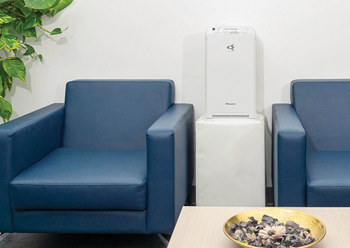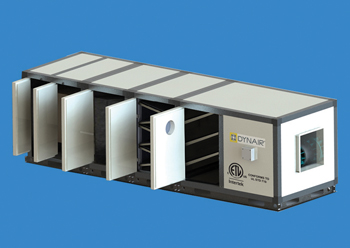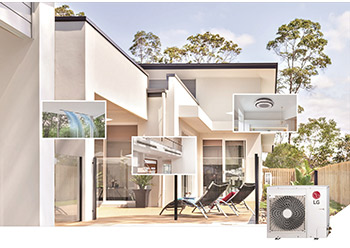
 Daikin offers a range of solutions to maintain good indoor air quality.
Daikin offers a range of solutions to maintain good indoor air quality.
With close to a fifth of its global turnover generated in the Middle East and Africa (MEA), Daikin has been focusing on boosting its regional presence with a portfolio of products that are tailored to the requirements of the market, where good indoor air quality (IAQ) and energy efficiency are paramount.
“Daikin MEA is steadily growing in the region amid its quest to offer the best HVAC-R technologies to its discerning customers. In 2020, it was awarded the Superbrands UAE Choice Award for excellence in providing customers with environment-friendly products,” Masaaki Miyatake, Daikin MEA Chairman and President, tells Gulf Construction.
Daikin understands the increased need for good IAQ as people spend more time indoors as part of safety precautions amidst the global pandemic, he says, adding that the leading Japanese air-conditioner manufacturing firm was among the first to respond by offering a range of products and solutions focusing on indoor air quality and purification.
“In this area, our portfolio of new products and solutions includes our flagship air purifiers, residential air handling unit (AHU) series, new filter technologies on fan coils, auto-cleaning technologies, and an improved AHU line-up for all applications, especially in the health sector,” he says.
 |
|
Miyatake ... Daikin’s aim is to meet and exceed local regulations. |
Innovations
The range of new HVAC-R solutions that is now available in the region include an air purifier with electrostatic HEPA filter and streamer technology, as well as an in-room compact air filtration device manufactured at Daikin’s UAE factory. The latter has three stages of filtration, including a low-pressure drop HEPA filter, and incorporates a high-efficiency EC fan to keep the power consumption lower. The two air purifiers are described as being ideal for existing buildings where the fresh air flow is fixed and have multiple filtration stages.
“For new multi-storey buildings with central ventilation devices, we see the need to combine low-pressure drop filters with heat recovery devices while using high-efficiency EC fans. This enhances fresh air changes without a major increase in electricity consumption. Flexibility in sizing the ventilation device is important to achieve a lower internal pressure drop. As such, sizing the ventilation device with height/width increments of 5 cm is a standard feature of the Daikin selection tool,” Miyatake says.
Daikin’s Modular L compact horizontal heat recovery unit for decentralised ventilation addresses the fresh air concerns in light commercial applications.
“With features such as counter-flow plate heat exchange with the low-pressure drop, multiple-stage filtration, and highly efficient EC fans, this product is perfect for indoor ceiling installation,” he adds.
Daikin’s offering also includes energy-efficient air-conditioners and refrigerants that are designed to reduce carbon emissions to help combat global warming. Its portfolio of eco-friendly solutions is backed by a service team, which can carry out retrofitting and IAQ upgrades of existing systems for improved efficiency and performance.
 |
|
A Daikin air purifier. |
“Moreover, our air-cooled screw chiller ranges and the water-cooled centrifugal systems based on variable frequency drive (VFD) technology boast premium efficiencies in compliance with government policies and regulations. As for split systems, our deployment of inverter technology can help bring about energy efficiency,” he explains.
Miyatake emphasises that all Daikin solutions that are available in the region are specially designed for the high ambient temperatures of the GCC region.
“Our aim is to meet and exceed local regulations for energy efficiency, refrigerant type, and operation range up to 55 degrees Celsius. We also follow IAQ-related standards in all our product offerings,” he states.
Daikin enjoys regional market leadership in a couple of segments, namely VRF/VRV (variable refrigerant flow/variable refrigerant volume) systems and premium efficiency air-cooled chillers, according to Miyatake, who points out that the company’s inverter split systems have become popular in key replacement and retrofit projects, due to the highest energy efficiency rates achieved.
Its wide range of indoor VRV air-conditioning systems include heat pump and cooling only, Mini VRV, and the water-cooled series.
“Daikin’s chiller range is highly competitive in the region as well. Under this category, we offer the premium efficiency screw chillers with HFO1234ze refrigerant and a new generation of air-cooled scroll chillers and heat pumps with R-32 refrigerant,” he adds.
Meanwhile, its innovative inverter product range ‘Bluevolution’ uses the green refrigerant R-32 and features a unique swing compressor design.
Daikin also offers to the region its modular chiller plants (MCPs) and pump skids, which are engineered to meet the demands of modern buildings. These are also highly flexible and can accommodate potential expansion in the future and improve lead times and single source responsibility, he adds.
In the refrigeration sector, Daikin acquired ‘Zanotti’ and ‘AHT’ to expand its existing product offerings. “With the acquisition, we can now efficiently meet commercial and industrial needs, from cold rooms and transportation to retail showcases and other applications,” Miyatake points out.
Daikin in MEA
Commenting on Daikin’s growth in the region, he says: “During our 15-year journey, we have grown our business by further strengthening our localisation efforts, expanding our sales, services, and dealer networks, and promoting sustainable solutions. We will continue with our mission to further penetrate each key market in the region, expand our sales network, increase our brand awareness, and strengthen our social responsibility initiatives, as part of our five-year management plan.”
Daikin has an AHU factory in Jebel Ali, Dubai, which opened in 2013 to manufacture Eurovent-certified AHUs. This facility can offer customised airside solutions for all applications.
A year after opening its AHU factory in Jebel Ali, Daikin completed a brand unification process and relaunched its brand under the new company name Daikin MEA. The company also started its modular solutions manufacturing activities to cater to the needs of the region.
To widen its presence in the region, it established local affiliates in Saudi Arabia, Egypt, Nigeria, and Qatar, and a new headquarters in Jebel Ali in 2019, which houses its offices, factory, and academy.
Further offices and service centres are expected to open across the region as Daikin pursues its localisation efforts and initiatives to strengthen its presence and leadership in each country it operates in.
Daikin also ensures that its presales, sales, and aftersales support is highly efficient and seamless to quickly respond to its customers, according to Miyatake.
“In the UAE, for instance, we manage service centres in Dubai and Abu Dhabi, which have more than 100 employees combined, from engineers to technicians who are available to support all customer needs. We have also established regional warehouses that contain spare parts and other key components and systems. We run a training academy as well to provide specialised trainings on HVAC-R products for our customers. Similar set-ups are available in Saudi Arabia, Egypt and Qatar, as part of our affiliates’ model.
“The latest technology complements Daikin’s efforts to provide quick response to customers’ needs whether for new orders or after-sales support. Our cloud-based smart control, remote monitoring, predictive maintenance, and energy management are just some of the control systems that help reduce breakdowns and enhance operations,” he points out.
Daikin has maintained its excellent business standing despite the difficult market conditions, with total global sales for air-conditioning and refrigeration having increased by 3.9 per cent year-on-year to $21.5 billion in the financial year that ended on March 30, 2020. Of the total turnover, the EMEA region accounted for 19 per cent, Miyatake states.
“Coming from a challenging global market situation in 2020, Daikin is looking at intensifying its efforts to innovate and meet the evolving client needs and anticipate future demands. Our R&D-related investments, specifically in our main markets, will continue to remain a top priority,” he says.
In Japan, its Technology and Innovation Center (TIC) is now set to release a cutting-edge elemental technology as a result of its R&D efforts.
“The technology is related to individual components of chillers and airside equipment such as compressors, fans, controls, and inverters. These innovations are going to be adopted by various regional Applied Development Centres for local market needs, including specific designs for the Middle East’s harsh environment,” he reveals.
Miyatake continues: “Furthermore, 2021 is a period for us to boost our programmes aimed at reducing the environmental impact made by cooling, heating, and refrigeration systems. Already, our range of green technologies is helping enhance air quality and reduce carbon emissions, but we seek to elevate our initiatives further to continue contributing to the sustainable goals of the global community.
“In Applied Systems, we will enhance our local engineering and manufacturing capabilities in the GCC region in line with our new five-year strategic management plan. In relation to this, we will further develop our off-site manufacturing and modular solutions across the MEA region, going beyond the flanges of only traditional chillers.”
“This year is an opportunity to demonstrate our resilience as an organisation and as part of the larger international community. We will look for new ways to contribute within our capacity to support global recovery and promote the highest safety and health standards in our work environment and in communities where we currently operate,” he concludes.

















.jpg)













 (1).jpg)















































.jpg)
